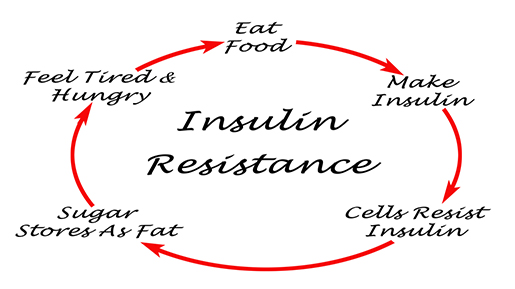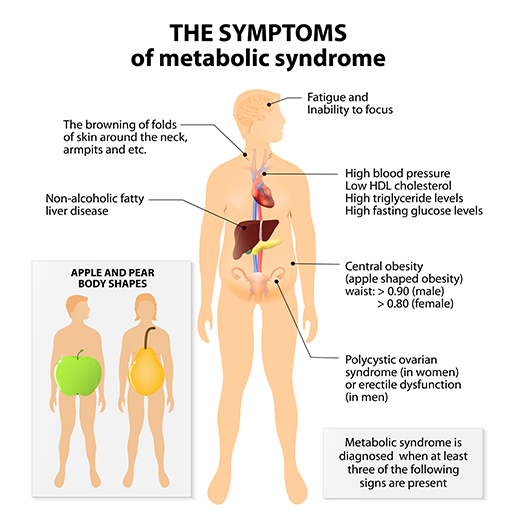 Insulin resistance happens when your body stops being able to properly use the insulin hormone that is manufactured by the body. It is a condition that can affect many systems of your body, as insulin is used for more than just managing glucose levels (key to blood sugar). Insulin plays a role in how well your metabolism works to process carbohydrates, fats and other nutrients like protein. When you develop insulin resistance, your body’s ability to manage energy and to properly process nutrients is seriously impaired.
Insulin resistance happens when your body stops being able to properly use the insulin hormone that is manufactured by the body. It is a condition that can affect many systems of your body, as insulin is used for more than just managing glucose levels (key to blood sugar). Insulin plays a role in how well your metabolism works to process carbohydrates, fats and other nutrients like protein. When you develop insulin resistance, your body’s ability to manage energy and to properly process nutrients is seriously impaired.
Causes
While there are known genetic factors that influence a person’s chance of developing insulin resistance, it is also associated with certain medical conditions that may or may not share the genetic profile of someone inclined to insulin resistance. The genetic profile implies that if you are Latino, African-American, Native American or Asian American you have an increased risk for developing the condition. If you are obese you also significantly raise your risk no matter what your genetic profile. Excess weight that is held around the waist area is associated with being at risk. Some of the diseases commonly present prior to the development of insulin resistance include fatty liver, arteriosclerosis, skin tags and women with abnormalities in the reproductive organs are prone to insulin resistance as well. Those with acanthuses nigricans are also considered to be at a higher risk and may not be aware they have the condition. “Acanthosis nigricans is a skin disorder that results in velvety, light-brown-to-black markings that occur in areas including the neck, armpits, groin, and under the breasts.” (source) That is why some overweight people experience a very dark coating in those areas that will sometimes be so thick it can be rubbed off.
Another cause identified for the condition has to do with conditions that may or may not be diseases or disorders but have in common that they place the body’s metabolism under unusual stress – these conditions can include:
- being pregnant
- taking steroids
- having a severe infection or unrelated illness
- high levels of stress
- high cholesterol
- use of steroids (prescribed or illegal)
- sedentary lifestyle
Symptoms
There are several symptoms that indicate the presence of insulin resistance; some can only be detected with a fasting blood glucose test performed by your doctor. This test will show whether or not your body is using glucose appropriately and responding to the body’s natural hormone level well. Symptoms that you may notice yourself are increased fatigue after eating, high blood pressure, high cholesterol levels, kidney problems and increased weight gain around the mid-section of the body. Another sign that you may have developed insulin resistance is if you have heart disease or Type 2 diabetes. Both of these conditions are considered to be symptomatic of insulin resistance rather than accompanying disorders.
Treatment
Treatment for insulin resistance usually consists of a threefold approach of diet, exercise and medication. Medication may be necessary to promote better insulin use within the body while you are creating lifestyle changes that can manage or even reverse the condition. One of the single most important causes of insulin resistance has been identified as obesity coupled with a sedentary lifestyle. Losing weight is not enough to reverse the condition; you have to increase your exercise level to create an impact on the metabolism of your body that is a part of the insulin management process. One caution is to make sure that you have your doctor and a nutritionist be a part of designing any weight loss and exercise program you may choose to start as having insulin resistance can become complicated by further placing the body under stress. With the proper steps in creating change in your lifestyle, you can reduce the impact of insulin resistance on your life if not eliminate it altogether.
Risk Factors
Left untreated, insulin resistance can be a leading contributor to kidney disease, heart disease and high blood pressure. Studies have begun to suggest that the ability of the body to process insulin and manage glucose levels in the blood stream may have an impact on the rate of development of cognitive problems related to aging. Insulin resistance can lead to an increased risk for morbid obesity and all the risks associated with that condition as well.
How it contributes to weight gain and weight loss
Insulin resistance can both cause weight gain and prevent weight loss because it impairs the body’s ability to use glucose as fuel. Without the ability to use the insulin hormone to metabolize carbohydrates, fats and proteins, there is little the body can do with the nutrients it has but to convert them into fat. Unfortunately, this is a very specific type of fat that is stored around the mid-section and has been linked to raised risks of certain types of cancers. While insulin resistance can make weight loss difficult to maintain, the body can self correct the condition given proper diet and exercise. It is a matter of being willing to commit to the protocol of lifestyle changes and medications (if necessary) to allow your body a chance to bring itself back into balance to avoid the risks associated with this condition.


Akisa Johnson says
Need more info on how to lose weight when insulin resistance.
Nicolene Roux says
I have just been diagnosed with insulin resistance diabetes type 2 together with high colestrol. I went to 5 doctors in 2 years since I had this condition. I also have sleeping apnoea. I need more information please. I need a diet as well please. I picked up over 30kg’s in 2 years. I am so tired of feeling and looking like this. Please help me